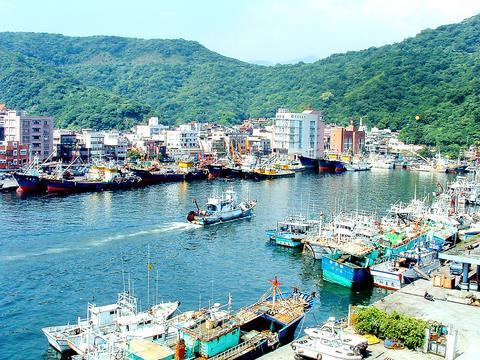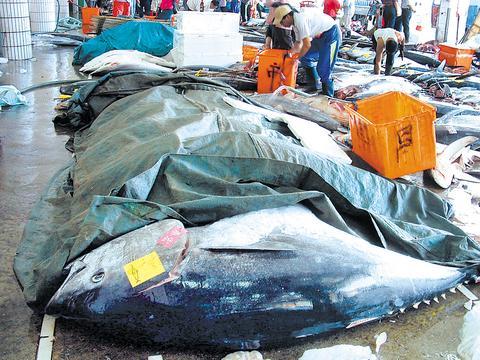For bluefin tuna gourmets living in northern Taiwan, Nan Fang Ao (南方澳) in Ilan County is an alternative to Pingtung's famous Tungkang.
Tourists have flocked to this fishing port for years to enjoy bluefin tuna in the summertime. In the seafood restaurants surrounding the harbor, top-quality toro for two people (7 pieces) could cost up to NT$1800. But gourmets are willing to pay.

PHOTO: LINDY YEH, TAIPEI TIMES
Bluefin tuna is a seasonal fish that appears in the western Pacific Ocean from Japan to the Philippines between April and July. The adult fish swim to this area to lay their eggs, and the season peaks in May and June.

PHOTO: LINDY YEH, TAIPEI TIMES
Toro is a Japanese term referring to the belly section of a bluefin tuna. The belly is considered the best part of the fish, and gourmets in Japan and Taiwan usually enjoy it raw, served like Japanese sashimi.
The belly is further classified into three grades, with the most delicious part at the front called o toro, the second-best part in the middle dubbed jo toro, while the back belly flesh is regarded as third-quality.
"Our business doubles when the Tungkang bluefin tuna festival begins," said Chu Wan-tsai (朱萬財), owner of the 24-year-old Chin Man Tzai restaurant (金滿載) located near Nan Fang Ao's fishing harbor.
According to Chu, the Tungkang bluefin festival has promoted the fish with great success.
Nan Fang Ao, a remote port village that could hardly be found on Taiwan maps only 10 years ago, has found fame thanks to its booming bluefin industry.
The village first won literary fame in a 1999 book, The Rise and Decline of the Nan Fang Ao Theater (南方澳大戲院興衰史), written by Chiu Kuen-liang (邱坤良), president of the Taipei National University of the Arts. The book became a bestseller as soon as it reached bookstores because its memoir-like style touched collective memories of village life and childhood.
After the book's release, people began to look for Nan Fang Ao's location. The village is 5km from Suao, a major commercial port in eastern Taiwan.
According to Chiu, although Nan Fang Ao fishermen's interactions with Chinese coastal cities have been frequent, the village has been a traditional stronghold of the Democratic Progressive Party (DPP).
Nan Fang Ao's fishermen listened to Chinese radio broadcasts for information about the weather at sea, a practice that used to be prohibited by Taiwan's "three noes policy" that mandated "no contact, no dialogue and no compromise."
Nan Fang Ao fishing boats often took shelter from storms and typhoons in Chinese harbors and were received warmly by China's "great motherland government" during the 1970s and 1980s, when cross-strait relations were highly antagonistic, Chiu said in his book. As "direct links" are still prohibited by the government, a fleet of six Nan Fang Ao fishing vessels broke the law by sailing to Fujian Province's Meichiou (湄洲) in May 2000 to worship the maritime goddess Matzu (媽祖).
These contacts with China have not affected the villagers' voting behavior, as the majority support the DPP as firmly as elsewhere in Ilan County.
Since the mid-1990s, advances in fishing equipment and the blufin tuna season have brought a tourism boom to Nan Fang Ao. The fishing industry has also attracted fishermen from Southeast Asian countries who have added multicultural elements to the village. In the evening, tourists enjoying ocean breezes may see young foreign fishermen chatting along the harbor and sometimes smiling at strangers.
According to Chen Tien-fu (陳添福), a Suao fishing association official at the fish market, large-scale bluefin tuna fishing began in 1994, and 80 percent of the catch initially was exported to Japan.
"But since four years ago, with the great success of Tungkang's bluefin tuna festival that has created a huge domestic market for the fish, only 20 percent of the catch is exported to Japan and the remaining 80 percent is for local clients," said Chen.
Though Nan Fang Ao's annual catch is smaller than Tungkang's, the Ilan County government is ambitiously commercializing the bluefin tuna.
In order to develop sophisticated bluefin cuisine beyond sashimi preparations, the Ilan County government offers cooking lessons for professional chefs and issues certificates for trained cooks and their restaurants.
As in Tungkang and some famous Japanese restaurants in Taipei, visitors to Nan Fang Ao can select from various bluefin tuna dishes.
Yet even though bluefin tuna cuisine has diversified, Chu said, "our gourmet clients want nothing but o toro sashimi. They don't care about the price, as long as you give them the best."
The success of bluefin tuna-related industries has also triggered worries about depletion of bluefin tuna stocks. Local environmental groups have urged fishing authorities to take restrictive measures to assure the sustainbility of the resource.
"Due to the overcatching of bluefin tuna, the fish the fishermen have caught are smaller in terms of size and quantities yearly. Without any sustainability measures imposed by the government, we don't know how long the annual bluefin tuna festival can last," said Lee Yung-jan (李永展), chairman of the Green Citizens' Action Alliance, in an article published last month.
Lee suggested imposing a harvest ceiling for each fishing boat, or regulating the size of fish that can be caught.
"Most important, ecological studies are needed on the annual fish festival's impact," Lee said.
However, Chen is skeptical about the ecologists' concerns.
"The harvests are fluctuating, as you may see in the statistics, due to many complicated elements, such as the sea current, food supplies and the size of fish schools," Chen said.
He said this year's catch in Nan Fang Ao is expected to be smaller than last year's mainly because Japanese navy patrols are much tougher this year in the overlapping territorial waters claimed by both Taiwan and Japan.
"They have constantly chased our fishing boats in that area this year. In addition, the price of squid, which is used as the bait for bluefin tuna, is double what it was last year. So many fishing boats have given up catching bluefin tuna this year," Chen explained.
Regarding the environmentalists' concerns, the Fisheries Administration said that setting stricter regulations on bluefin tuna fishing does not involve Taiwan alone.
"Since there are many countries involved in the bluefin tuna fishery, international organizations are the proper place to set rules for the countries involved. As long as new regulations are agreed upon by [all] involved countries, we are willing to abide by them," said Wu Man-chuan (吳滿全), a Fisheries Administration section chief.
The international organization in charge of this area's bluefin tuna fishery is the Western and Central Pacific Fishery Commission, of which Taiwan is a member.

Alain Robert, known as the "French Spider-Man," praised Alex Honnold as exceptionally well-prepared after the US climber completed a free solo ascent of Taipei 101 yesterday. Robert said Honnold's ascent of the 508m-tall skyscraper in just more than one-and-a-half hours without using safety ropes or equipment was a remarkable achievement. "This is my life," he said in an interview conducted in French, adding that he liked the feeling of being "on the edge of danger." The 63-year-old Frenchman climbed Taipei 101 using ropes in December 2004, taking about four hours to reach the top. On a one-to-10 scale of difficulty, Robert said Taipei 101

A preclearance service to facilitate entry for people traveling to select airports in Japan would be available from Thursday next week to Feb. 25 at Taiwan Taoyuan International Airport, Taoyuan International Airport Corp (TIAC) said on Tuesday. The service was first made available to Taiwanese travelers throughout the winter vacation of 2024 and during the Lunar New Year holiday. In addition to flights to the Japanese cities of Hakodate, Asahikawa, Akita, Sendai, Niigata, Okayama, Takamatsu, Kumamoto and Kagoshima, the service would be available to travelers to Kobe and Oita. The service can be accessed by passengers of 15 flight routes operated by

Taiwanese and US defense groups are collaborating to introduce deployable, semi-autonomous manufacturing systems for drones and components in a boost to the nation’s supply chain resilience. Taiwan’s G-Tech Optroelectronics Corp subsidiary GTOC and the US’ Aerkomm Inc on Friday announced an agreement with fellow US-based Firestorm Lab to adopt the latter’s xCell, a technology featuring 3D printers fitted in 6.1m container units. The systems enable aerial platforms and parts to be produced in high volumes from dispersed nodes capable of rapid redeployment, to minimize the risk of enemy strikes and to meet field requirements, they said. Firestorm chief technology officer Ian Muceus said

MORE FALL: An investigation into one of Xi’s key cronies, part of a broader ‘anti-corruption’ drive, indicates that he might have a deep distrust in the military, an expert said China’s latest military purge underscores systemic risks in its shift from collective leadership to sole rule under Chinese President Xi Jinping (習近平), and could disrupt its chain of command and military capabilities, a national security official said yesterday. If decisionmaking within the Chinese Communist Party has become “irrational” under one-man rule, the Taiwan Strait and the regional situation must be approached with extreme caution, given unforeseen risks, they added. The anonymous official made the remarks as China’s Central Military Commission Vice Chairman Zhang Youxia (張又俠) and Joint Staff Department Chief of Staff Liu Zhenli (劉振立) were reportedly being investigated for suspected “serious